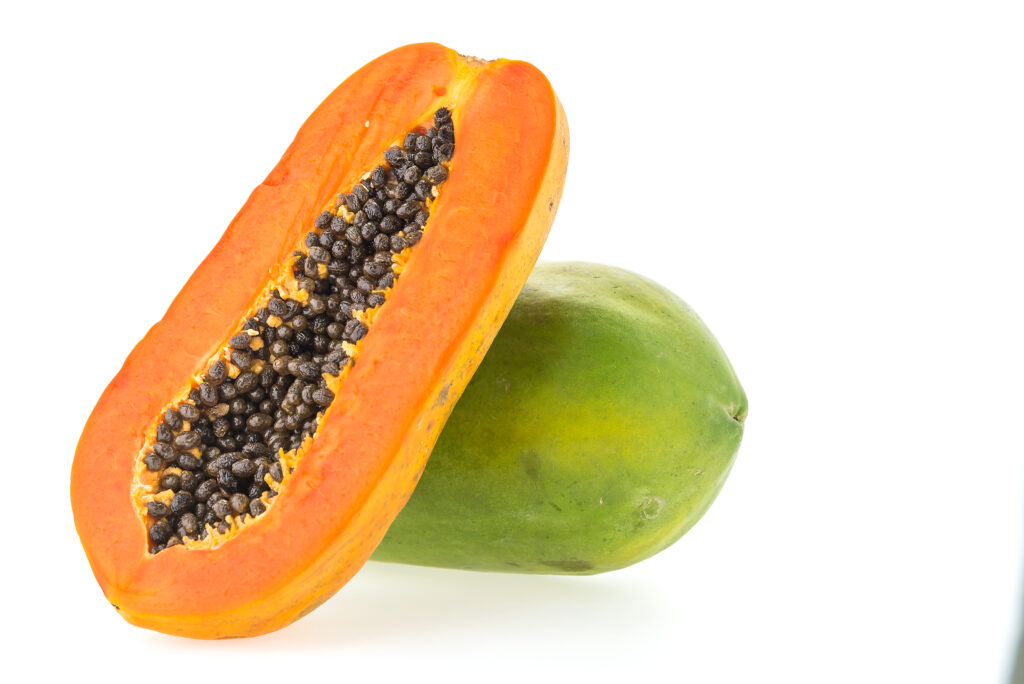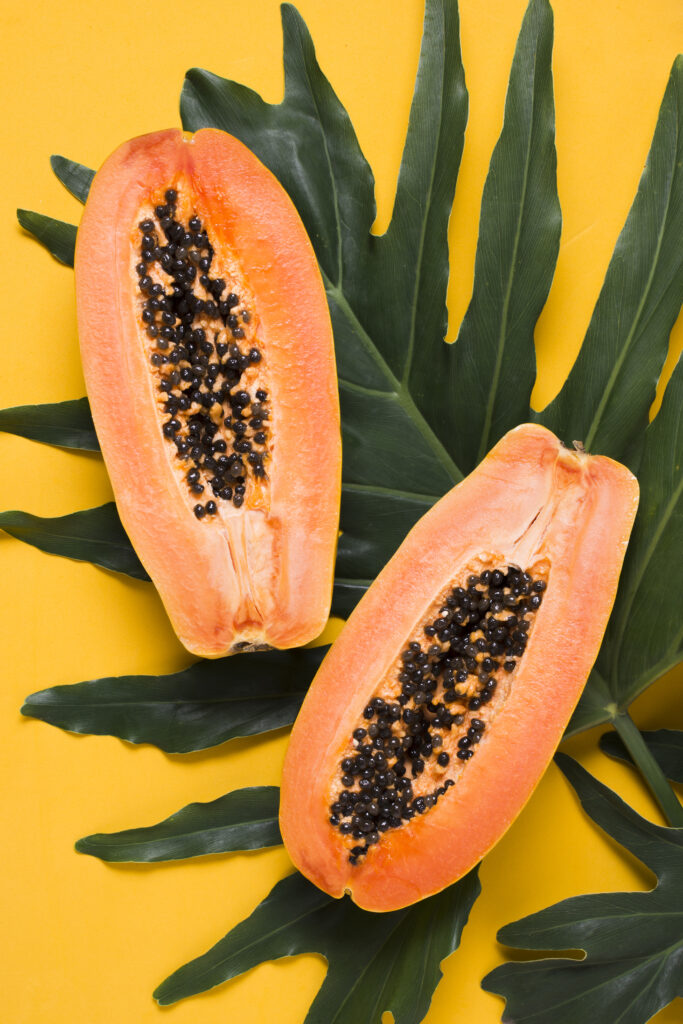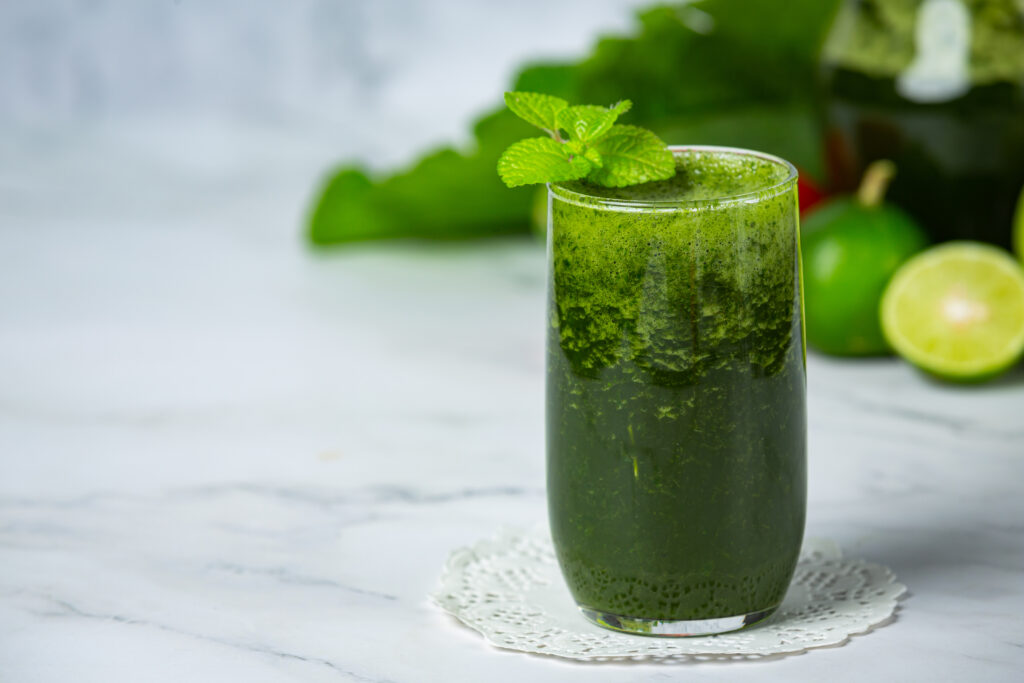When you picture papaya, you probably visualize the sweet, orange tropical fruit that you have had, most likely at breakfast. But what if we told you that one of the most powerful wellness secrets of nature lay not in the fruit, but in the widely dismissed collection of broad-green leaves of the papaya tree?
For centuries, the world’s traditional medicine systems, most notably Ayurveda in India, to folk medicine systems in Central America, have been leveraging the power of papaya leaf juice benefits. But only in recent years has modern day science begun to somewhat “catch-up” to these traditional systems, and expose bioactive compounds, that make the papaya leaf juice a real superfood.
Let’s turn to the health potential that papaya leaf juice has to offer. It’s time to look at this simple leaf as a health food, not simply repurposing the papaya tree and fruit in your smoothies.
These posts are very useful for your diet journey- Rose apple benefits, Ice apple benefits, Star fruit benefits…and more in health-icon.com

10 Papaya Leaf Juice Benefits
While its ability to increasing platelet count is what it’s famous for, papaya leaf juice benefits beyond that. Here are 10 good reasons you should think about adding it to your health routine.
1. A Powerful Friend of Your Immune System
Papaya leaf juice benefits contain immune-modulating constituents, like papain and alkaloids. They stimulate the production of immune cells that arm your body’s defense system to fight off any invaders from the common cold to more chronic pathogens.
2. A Natural Anti-Inflammatory
Chronic inflammation is the basis of many modern diseases. The flavonoids and papain in papaya leaf juice benefits have important anti-inflammatory effects. This would help people who suffer from inflammatory conditions, like arthritis and joint pain and even skin conditions like acne and eczema, when applied topically.
3. Supports Digestive Health
Similar to the fruit, papaya leaves are rich in the enzyme papain. Papain is an effective digestive agent as it helps to break down proteins, which are easier to digest. So if you experience symptoms of bloating, indigestion, or heartburn after meals, just a little amount of papaya leaf juice benefits may help calm your digestive tract and allow for better absorption of nutrients.
4. Supports Healthy, Glowing Skin
Because it is high in vitamins A, C, and E, along with powerful antioxidants, papaya leaf juice benefits for the skin. These compounds may help alleviate free radical damage that leads to premature aging (wrinkles and fine lines). It also possesses anti-inflammatory properties that may assist with acne. Some even apply the papaya leaf juice topically as a mask to renew the skin.
5. Powerful Antioxidant
Due to free radicals, our bodies are continuously working against oxidative stress. Papaya leaf juice benefits are rich in antioxidants such as flavonoids and phenolic compounds that will fight free radicals and protect your cells from damage, and could possibly decrease your risk of chronic diseases.
6. May Help in Blood Sugar Regulation
Some new studies suggest that the papaya leaf juice benefits may positively influence blood sugar levels. It may protect the insulin-producing cells in the pancreas and help with insulin sensitivity. It´s not a treatment, but it’s a possible natural supplement, and should be checked with your doctor.
7. Supports Liver Health and Detoxification
The liver is our primary detoxification organ, and papaya leaf juice benefits appears to have a protective effect on it. Its phytochemicals help to detoxify, and can even help with liver healing in mild liver disease. For some, it can act as a natural blood purifier.
8. A Friend for Your Hair and Scalp
The nutrients in papaya leaf juice benefits can improve scalp health and support healthier hair. The antioxidants counter dandruff and their purported ability to improve circulation may also assist with hair growth. A traditional remedy for hair follicles is the application of papaya leaf paste on the scalp.
9. Possesses Anti-Cancer Potential
This is an area of promise and initial research. There are laboratory studies that demonstrated papaya leaf juice benefits can inhibit the growth of certain cancer cells, while being non-toxic to healthy cells. The proposed compound responsible for this activity is acetogenin. It is sincere to clarify that this is not an anticancer treatment, and rather, that it reflects the ravishing nature of the bioactive components present in the leaf.
10. Boosts Energy Levels
Are you feeling tired? Papaya leaf juice benefits contains a multitude of nutrients, particularly B vitamins and folate that helps to support an individual’s energy production. Many regular users report natural and prolonged energy increases, making it a more healthful alternative to caffeinated beverages.

Papaya Leaf Juice For Platelets
No question, this is the benefit that put papaya leaf juice on the map globally, especially in the wake of outbreaks of dengue fever.
Dengue fever is a viral disease that can cause a dramatic drop in blood platelet count, which is known as thrombocytopenia. Platelets are critical in forming blood clots and can lead to serious internal bleeding when the count falls extremely low.
So what on earth does papaya leaf juice help with?
Of course, how papaya leaf juice works is still under investigation, but it appears that the leaves’ complex mixture of compounds, which includes carpaine and other alkaloids, accomplishes two primary things.
- Stimulates Platelet Production: It signals the bone marrow—the factory where blood cells are made—to ramp up the production of platelets.
- Prevents Platelet Destruction: Certain compounds may protect the existing platelets from being damaged or destroyed by the virus.
Numerous studies have demonstrated that dengue patients who were given either papaya leaf juice or extract had a statistically significant and rapid increase in platelet counts. As such, many doctors and healthcare practitioners residing in tropical locations have offered it as an adjunct therapy to conventional medical treatment.
It is a powerful, natural intervention that may assist the body in recovering from a serious viral attack.
Papaya Leaf Juice Nutrition
Don’t be deceived by the papaya leaf’s unassuming appearance; it is a nutrient dense carrier of important nutrients and bioactive enzymes! The exact nutrient profile can vary slightly, but here is a list of powerhouse compounds available in a glass of papaya leaf juice:
- Enzymes: Papain and Chymopapain are the stars, renowned for their protein-digesting and anti-inflammatory powers.
- Alkaloids: Compounds like Carpaine are credited with the platelet-boosting and anti-malarial properties.
- Vitamins:
- Vitamin A: Essential for vision, immune function, and skin health.
- Vitamin C: A mighty antioxidant crucial for immunity and collagen production.
- Vitamin E: Protects cell membranes from oxidative damage.
- B Vitamins: Including folate, which supports energy and cell growth.
- Minerals:
- Iron: Vital for creating red blood cells and preventing anemia.
- Calcium: For strong bones and teeth.
- Potassium: An electrolyte that regulates fluid balance and nerve signals.
- Powerful Antioxidants: Including flavonoids and phenolic compounds that give the juice its free-radical-fighting capability.
This unique blend of nutrients is what makes papaya leaf juice benefits more effective than the sum of its ingredient profiles.

How To Make Papaya Leaf Juice
Making your own papaya leaf juice benefits are high, but the taste is notoriously bitter. Here’s a step-by-step guide to preparing it in a way that’s both effective and palatable and consume papaya leaf juice benefits.
What You’ll Need:
- A handful of fresh, organic papaya leaves (about 5-7 medium-sized leaves)
- A knife and cutting board
- A blender
- A strainer or cheesecloth
- A pinch of salt (optional)
- Other juices or honey to mask the taste (e.g., lime, orange, carrot, or pineapple juice)
Instructions:
- Source the Leaves: Find a source of organic papaya leaves, ideally from a tree that hasn’t been treated with pesticides. Your backyard or a trusted local nursery are great options.
- Wash Thoroughly: Rinse the leaves under cool running water, gently rubbing them to remove any dirt or debris.
- Chop: Remove the tough central stem of each leaf. Then, roughly chop the leaves to make them easier for your blender to process.
- Blend: Place the chopped leaves in a blender. Add a small amount of water—just enough to get the blades moving (about ½ to 1 cup). Blend until you get a smooth, green, and frothy liquid.
- Strain: Place a fine-mesh strainer or a piece of cheesecloth over a bowl or jug. Pour the blended mixture through it. Use a spoon to press down on the pulp, squeezing out every last drop of the potent green juice.
- Flavor (This is Key!): The raw juice is intensely bitter. To make it drinkable, mix it with a stronger-flavored juice. Pineapple juice is a fantastic option as its sweetness and acidity cut through the bitterness remarkably well. Lime juice and a teaspoon of honey also work wonders. A pinch of salt can help balance the flavors.
- Serve: Drink your freshly prepared juice immediately on an empty stomach for best absorption. A typical serving is about 1-2 tablespoons of pure juice mixed into your chosen base.
Storage: It’s always best to make and consume it fresh. However, you can freeze the pure, strained juice in ice cube trays for future use.
Papaya Leaf Juice Side Effects
While papaya leaf juice is a natural substance, “natural” does not always mean “without risk.” It is a potent herbal medicine, and it’s crucial to use it wisely.
- Pregnancy and Breastfeeding: This is the most critical warning. Papaya leaf juice should be avoided during pregnancy. The latex in the leaves can have abortifacient effects, potentially stimulating contractions and leading to miscarriage. Its safety during breastfeeding is unknown, so it’s best to avoid it.
- Allergy: If you are allergic to papaya fruit, papain, or latex, you will likely be allergic to the leaf juice as well. Start with an extremely small amount to test for any reaction.
- Medication Interactions: Due to its powerful effect on the liver, it could potentially interfere with medications that are processed by the liver. If you are on any prescription drugs, especially for diabetes (as it can lower blood sugar) or blood thinners like Warfarin, it is absolutely essential to consult your healthcare provider before trying papaya leaf juice.
- Taste and Stomach Upset: The bitterness can be overwhelming for some and may cause nausea. Always dilute it and start with a small dose. Excessive consumption can lead to stomach irritation.
- Not a Substitute for Medical Care: Most importantly, papaya leaf juice is a supportive therapy, not a cure. In cases of serious illness like dengue fever, it should be used alongside professional medical treatment, not as a replacement for it.
Conclusion
Papaya leaf juice benefits are a testament to the idea that profound healing often comes from the most unexpected places. From its celebrated role in boosting platelets to its broad-spectrum support for immunity, digestion, and skin health, this bitter green elixir is a powerful addition to the natural wellness toolkit.
As with any potent remedy, respect its power. Start slow, listen to your body, and always prioritize professional medical advice for serious conditions. Here’s to unlocking the vibrant health that nature has hidden in plain sight, one green leaf at a time.
Disclaimer: The information provided on this website is for general educational and awareness purposes only. It should not be considered a substitute for professional medical advice, diagnosis, or treatment. Always consult your doctor or a qualified healthcare professional before making any changes to your diet, medication, or health routine. The author and website are not responsible for any outcomes resulting for the use of this information.
FAQs
Does papaya leaf juice increase platelets?
Yes. Studies show it can significantly increase platelet counts, making it a popular supportive remedy during illnesses like dengue fever.
How long does it take for papaya leaf juice to work?
Effects can vary, but improvements in platelet count, particularly for dengue patients, are often observed within 24 to 48 hours or 3 to 5 days of regular consumption.
Can we drink papaya leaf juice daily?
Drinking it daily in moderate amounts (e.g., 25-30 ml of juice) is generally considered safe for most people. However, consult a healthcare provider if you have pre-existing conditions or are on medication.
What are the main side effects?
It may cause mild digestive discomfort (nausea, stomach upset). Those allergic to papaya, papain, or latex should avoid it. Pregnant or breastfeeding women should not use it due to potential risks.
Are there any drug interactions?
Yes. It may interact with blood-thinning medications (e.g., warfarin), increasing bleeding risk, and could enhance the effects of diabetes drugs, potentially causing low blood sugar. Always consult your doctor.
5 thoughts on “Papaya Leaf Juice Benefits”